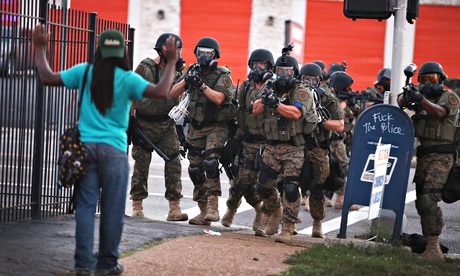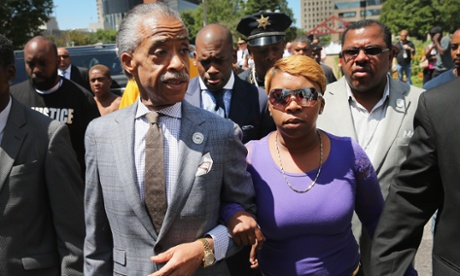BLACK SOCIAL HISTORY Michael Brown shooting: 'They killed another young black man in America'
African American teenager's killing by police puts Missouri city on edge after another night of protests

Police confront protesters in Ferguson, St Louis, after the shooting by police of an unarmed black teenager, Michael Brown. Photograph: Scott Olson/Getty Images
Michael Brown was on the right path, according to his family and friends. Studying did not come easily, but the 18-year-old worked hard at Normandy high school and graduated in May. Mike had been due to start classes at Vatterott College last Monday. He was excited to enter the world of business.
"This is a boy who did everything right," said Cornell Brooks, the president of the National Association for the Advancement of Colored People, "who never got into a fight, who stayed in school."
While some boys would get into edgy scrapes, Mike, a "gentle giant", wasn't interested, said Chris McMillan, a 20-year-old childhood friend who grew up playing PlayStation with Brown.
"He was a cool person," said McMillan. "He was laidback and respectful. None of that nonsense. None of the crews and gangs. We'd just play games, chill, and ride around."
On Saturday afternoon, Brown was shot to death by a police officer while apparently walking, unarmed, from a convenience store to his grandmother's apartment in Ferguson, a working-class suburb north of St Louis, the main hub of this midwestern state.
The lethal flash of violence has sparked a series of furious protests across the small city, and a fresh crisis over civil rights and police brutality in the US.
Acknowledging that Brown was shot "more than just a couple of times", police chiefs have said in a partial explanation that the shooting followed a struggle in the officer's patrol car over his gun, during which Brown "physically assaulted" him.
But this is dismissed by Dorian Johnson, a friend who said he was walking with Brown. Johnson told MSNBC that the officer ordered the pair, who were walking in the road, to "get the fuck on to the sidewalk".
They told him that they were almost at their destination, and continued.
The officer, according to Johnson's account, tried to open the door of his patrol car, but it struck Brown and bounced back. Johnson, 22, claimed that the officer then grabbed Brown by the neck and struggled with him, twice threatening: "I'll shoot."
"I seen the barrel of the gun pointed at my friend," Johnson said. "I seen the fire come out of the barrel." Johnson claimed that the pair ran, but the officer caught up with Brown and shot him several more times at close range. Johnson's lawyer said police had declined to speak to him.
The officer, a Ferguson city police officer who has not been named publicly, has been placed on paid leave while the shooting is investigated by the separate St Louis county police department. The FBI is also looking into whether the incident caused civil rights violations.
In a statement on Tuesday, Barack Obama described Brown's death as "heartbreaking". Noting the FBI investigation, the president appealed for calm. "I know the events of the past few days have prompted strong passions, but as details unfold, I urge everyone in Ferguson, Missouri, and across the country, to remember this young man through reflection and understanding. We should comfort each other and talk with one another in a way that heals, not in a way that wounds."
The official response to Brown's death has been rejected as insultingly inadequate by many African-American residents of Ferguson, a city of about 21,000 people where 67% of the population is black, yet 94% of the police force – and prominent figures in local government, such as the mayor – are white.
"I got seven brothers," said Brittany Troupe, 24, who said she worked at Home Depot and studied fine art in her spare time. "Are they going to be killed by the men who are supposed to protect and serve them? It hurts my heart."
"We want this man arrested, in jail, and charged for murder," the Rev James Stewart, pastor of the nearby Murchison Tabernacle church, said of the officer involved, to loud applause at a town hall meeting.
Brooks accused the police of a "subculture" of racism.
 Lesley McSpadden, right, the mother of Michael Brown, arrives for a press conference on the arm of civil rights leader Rev Al Sharpton. Photograph: Scott Olson/Getty Images
Lesley McSpadden, right, the mother of Michael Brown, arrives for a press conference on the arm of civil rights leader Rev Al Sharpton. Photograph: Scott Olson/Getty Images
After a day of searing sunshine, seething young protesters took to the streets again on Monday night, 24 hours after a similar demonstration led to looting and the burning down of a petrol station. They scrawled slogans such as "Avenge Mike Brown" and "Kill cops" on mailboxes.
While some protesters threw bricks and stones at police, others walked with their arms aloft, saying: "Hands up, don't shoot!" Police in riot gear from several forces across the region used dogs, tear gas and rubber bullets to quell the protests.
Demonstrators were dispersed by being shot at with solid wooden baton rounds, a controversial "less lethal" crowd control weapon. Steve Walsh, 26, displayed a bloody wound to his neck, which he said was caused by one of the rounds.
Demonstrators loudly and repeatedly accused the city police of hating black people. Some compared Brown's killing to those of Eric Garner at the hands of police in New York earlier this month and the fatal shooting by a neighbourhood watch captain of Trayvon Martin, an unarmed 17-year-old, in Florida, in 2012.
"They killed another young black man in America," said Derek Chappel, 21, who said that he was shot in the abdomen and on one of his legs by some kind of non-lethal projectile. "That was my friend they shot."
Exasperated civil rights leaders pointed to the stability of Brown's family life as evidence against repeated claims that a lack of father figures, or broken homes, are to blame for violence blighting the lives of many African-American boys. Brown was close to both his father, Michael Brown senior, and his stepfather, Louis Head.
"Michael Brown as a young man came up in a community," said Brooks. "He came up in a family, a mother who loved him, a father who loved him, a stepfather who loved him, friends who loved him, classmates who loved him."
Brown's parents appeared on Tuesday alongside the Rev Al Sharpton, the prominent civil rights leader, who called for the federal government to take over the investigation into the shooting.
His distraught mother, Lesley McSpadden, has lamented that all Mike's efforts were for nothing.
"Do you know how hard it was for me to get him to stay in school and graduate?" McSpadden asked earlier on KMOV, a local TV station. "You know how many black men graduate?























































































































































No comments:
Post a Comment